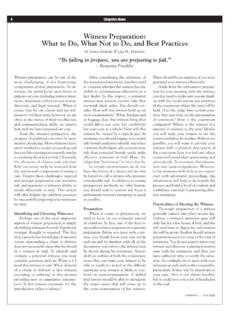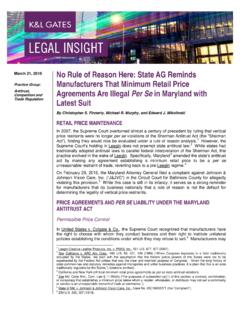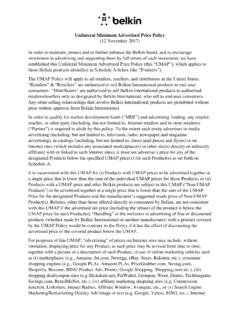Transcription of COVER STORIES Antitrust Resale Price Maintenance and the ...
1 Resale PriceMaintenance and the World After LeeginBY MICHAEL A. LINDSAY gence to their resellers as long as they didn t agree on areselling Price . Many manufacturers took this a step furtherand adopted what came to be called Colgatepolicies : themanufacturer announced the minimum Resale prices that itwanted to see and announced a policy that it would not dealwith discounters. In other words, at any given time thereseller would be free to sell its existing inventory at whatev-er Price it chose, but the manufacturer could lawfully refuseto resupply a reseller whom it discovered to be discountingbelow MSRP. The Dr. Milesrule of per se illegality originally applied tononprice vertical agreements that could have a significanteffect on Price .
2 The Supreme Court s 1977 GTE Sylvaniadecision held that non- Price vertical restraints should be eval-uated under the rule of reason. 4 The rule of reason requirescourts to examine the specific agreement and evaluate itsactual effects on competition (in contrast to the per seapproach, which conclusively presumes that the condemnedconduct always or almost always has a net negative effect oncompetition). Under the rule of reason, an agreement isunlawful only if it has a net negative effect on Supreme Court chipped further at the Dr. Milesrulein its 1997 State Oil v. Khan, the Court heldthat maximum vertical Price agreements that is, agreementssetting a Price ceiling above which sales cannot be made would no longer be judged as illegal per se but would insteadbe judged under the rule of reason.
3 Yet minimum Resale priceagreements agreements not to discount below a pricefloor remained subject to the Dr. Milesper se rule foranother v. PSKSThe Leegincase arose because a company that started with aColgatepolicy ended up with reseller agreements. Leegin wasa small, start-up manufacturer of women s accessories, suchas handbags, shoes, and jewelry, and it was trying to competewith larger, established manufacturers and with departmentstores and other retail chains. Leegin adopted a retail Pricingand Promotion Policy stating that it would sell its Brighton-branded products only to retailers that followed Leegin sMSRPs. Leegin took one step too many, however, and crossedthe line separating unilateral announcement from bilateralagreement by demanding that all of its retailers pledge theircompliance with the pricing policy.
4 PSKS (d/b/a Kay sKloset) pledged, then broke its promise by discounting theentire Brighton line. Leegin suspended shipments to Kay s;Kay s sales plunged, and Kay s sued. A jury found for Kay s,but only after the trial court excluded Leegin s proffer ofexpert testimony that Leegin s pricing policy was actuallyprocompetitive. Supreme Court DecisionLeeginsquarely presented the question of whether the se ban on minimum Resale Price agreements shouldcontinue to be the law, and the Supreme Court said STORIES32 ANTITRUSTM ichael Lindsay is a partner at Dorsey & Whitney LLP. He is Vice-Chairof the ABA Section of Antitrust Law Trial Practice Committee and was thepublication co-chair for the Antitrust Section s Indirect Purchaser Litiga-tion Handbook(2007).
5 He thanks Kevin Ueland, James Nichols, andSheldon Gilbert for their research assistance on this article and accom-panying OVERRULING THE CENTURY-OLDper se rule against minimum Resale Price Maintenance (RPM) agreements, the Supreme Court has invit-ed businesses to reconsider their distribution , Leegindid not make all minimum RPMagreements automatically lawful; nor did it directly addressthe status of minimum RPM agreements under state on an ABA Antitrust Section listserv in the daysfollowing the release of Leeginsuggested a raft of possibili-ties: it is still illegal per se in a number of states, and many (perhaps most) states, either by the express terms oftheir statutes or by decision of the state s highest court,interpret their little Sherman Acts to conform to federalcourt interpretations of the federal Sherman Act, and [a]bsent legislation, this could be a long and messy slog.
6 1 Counsel and clients must consider the circumstances inwhich RPM agreements might still be illegal under federallaw, as well as the role that state laws will play. The chartaccompanying this article (see pages 37 40), Overview ofState RPM (Abbreviated), may serve as a starting point forsuch consideration. (The complete version of this chart that includes all relevant states can be found at )BackgroundIn 1911, Dr. Milesheld that a supplier could not lawfullyrestrict its reseller s pricing the Colgatecase eightyears later, the Supreme Court clarified that there was noantitrust violation unless there was an agreement betweenthe supplier and its reseller because the Sherman Act for-bids only agreements that restrain trade, not unilateral prac-tices that may have the same practical mere sug-gestion of a Resale Price was not an agreement in restraintof trade; manufacturers were free to provide Manufacturer sSuggested Resale Prices (MSRPs) and other market intelli- Antitrust ,Vol.
7 22, No. 1, Fall 2007. 2007 by the American Bar Association. Reproduced with permission. All rights reserved. This information or any portion thereof may not becopied or disseminated in any form or by any means or stored in an electronic database or retrieval system without the express written consent of the American Bar 2007 33 First, the Court found that were it to write on a clean slate,without the Dr. Milesprecedent, it would have held thatresale Price agreements should be judged under the rule of rea-son approach that looks at an agreement s actual effects oncompetition. Agreements should fall into the per se catego-ry only if the type of agreement at issue would always oralmost always injure competition, for example, Price -fixingagreements between competitors.
8 In contrast, minimum resaleprice agreements can have procompetitive benefits that out-weigh the anticompetitive harms. The Court had held in Khanthat the primary purpose ofantitrust is to protect interbrand competition for example,competition between the Pepsi and Coke brands of RPM agreements can increase interbrand com-petition precisely because they reduce intrabrand competi-tion among retailers selling the same brand. By assuringresellers that they will not face discount Price competitionfrom other resellers of the same brand, minimum RPM agree-ments encourage retailers to invest in services or promotion-al efforts to sell that brand against competing brands. More-over, by eliminating the risk that one reseller might free ride on another reseller s provision of these services, minimumRPM agreements can give consumers more choices amonglow- Price /low-service brands, high- Price /high-service brands,and brands falling in between.
9 RPM can also help new brandsenter the market by enabling resellers to provide the pre-saleservices necessary to compete with entrenched , the Court found that principles of stare decisis judicial reluctance to overrule earlier decisions did notrequire the Court to adhere to the Dr. Milesrule, even thoughit had stood for nearly a century. The doctrinal basis for thedecision had been undermined by decisions like Sylvaniaand Khan, and its economic basis has been shown to beflawed. Moreover, Congress had intended the Antitrust lawsto evolve much like the common law has evolved as courtsgain knowledge and experience. Evaluation Under Federal Rule of ReasonLeegindid not hold that minimum RPM agreements are perse legal. Indeed, Leeginitself identified at least two ways inwhich a purely vertical minimum RPM agreement might beunlawful.
10 In both instances, the wrongfulness is premised onmarket power either the retailer s or the manufacturer s: A dominant retailer .. might request Resale Price main-tenance to forestall innovation in distribution that decreas-es costs. A manufacturer might consider it has little choicebut to accommodate the retailer s demands for verticalprice restraints if the manufacturer believes it needs accessto the retailer s distribution network. 7 A manufacturer with market power .. might use resaleprice Maintenance to give retailers an incentive not to sellthe products of smaller rivals or new entrants. 8In both of these examples, the dominant (or at least verypowerful) firm uses minimum RPM to exclude or raise entrybarriers for its competition. Anticompetitive minimum RPMcan also result from collusion or conscious parallelism inconcentrated industries.










